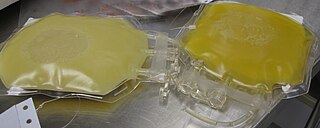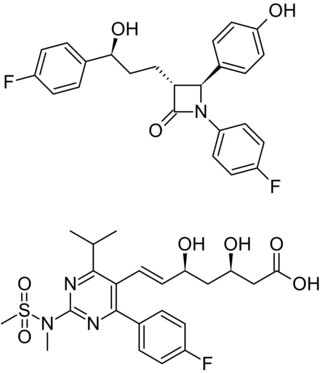Related Research Articles

Statins, also known as HMG-CoA reductase inhibitors, are a class of lipid-lowering medications that reduce illness and mortality in those who are at high risk of cardiovascular disease. They are the most commonly prescribed cholesterol-lowering drugs.
Lipid-lowering agents, also sometimes referred to as hypolipidemic agents, cholesterol-lowering drugs, or antihyperlipidemic agents are a diverse group of pharmaceuticals that are used to lower the level of lipids and lipoproteins such as cholesterol, in the blood (hyperlipidemia). The American Heart Association recommends the descriptor 'lipid lowering agent' be used for this class of drugs rather than the term 'hypolipidemic'.

Hypercholesterolemia, also called high cholesterol, is the presence of high levels of cholesterol in the blood. It is a form of hyperlipidemia, hyperlipoproteinemia, and dyslipidemia.
Dyslipidemia is a metabolic disorder characterized by abnormally high or low amounts of any or all lipids or lipoproteins in the blood. Dyslipidemia is a risk factor for the development of atherosclerotic cardiovascular diseases (ASCVD), which include coronary artery disease, cerebrovascular disease, and peripheral artery disease. Although dyslipidemia is a risk factor for ASCVD, abnormal levels don't mean that lipid lowering agents need to be started. Other factors, such as comorbid conditions and lifestyle in addition to dyslipidemia, is considered in a cardiovascular risk assessment. In developed countries, most dyslipidemias are hyperlipidemias; that is, an elevation of lipids in the blood. This is often due to diet and lifestyle. Prolonged elevation of insulin resistance can also lead to dyslipidemia. Likewise, increased levels of O-GlcNAc transferase (OGT) may cause dyslipidemia.

Atorvastatin, is a statin medication used to prevent cardiovascular disease in those at high risk and to treat abnormal lipid levels. For the prevention of cardiovascular disease, statins are a first-line treatment. It is taken by mouth.

Simvastatin, sold under the brand name Zocor among others, is a statin, a type of lipid-lowering medication. It is used along with exercise, diet, and weight loss to decrease elevated lipid levels. It is also used to decrease the risk of heart problems in those at high risk. It is taken by mouth.

Fluvastatin is a member of the statin drug class, used to treat hypercholesterolemia and to prevent cardiovascular disease.

Ezetimibe is a medication used to treat high blood cholesterol and certain other lipid abnormalities. Generally it is used together with dietary changes and a statin. Alone, it is less preferred than a statin. It is taken by mouth. It is also available in the fixed combinations ezetimibe/simvastatin, ezetimibe/atorvastatin, ezetimibe/rosuvastatin, and ezetimibe/bempedoic acid.

Ezetimibe/simvastatin is a drug combination used for the treatment of dyslipidemia. It is a combination of ezetimibe and the statin drug simvastatin.

Familial hypercholesterolemia (FH) is a genetic disorder characterized by high cholesterol levels, specifically very high levels of low-density lipoprotein cholesterol, in the blood and early cardiovascular diseases. The most common mutations diminish the number of functional LDL receptors in the liver or produce abnormal LDL receptors that never go to the cell surface to function properly. Since the underlying body biochemistry is slightly different in individuals with FH, their high cholesterol levels are less responsive to the kinds of cholesterol control methods which are usually more effective in people without FH. Nevertheless, treatment is usually effective.

Proprotein convertase subtilisin/kexin type 9 (PCSK9) is an enzyme encoded by the PCSK9 gene in humans on chromosome 1. It is the 9th member of the proprotein convertase family of proteins that activate other proteins. Similar genes (orthologs) are found across many species. As with many proteins, PCSK9 is inactive when first synthesized, because a section of peptide chains blocks their activity; proprotein convertases remove that section to activate the enzyme. The PCSK9 gene also contains one of 27 loci associated with increased risk of coronary artery disease.

Lomitapide, sold under the brand name Juxtapid in the US and Lojuxta in the EU, is a medication used as a lipid-lowering agent for the treatment of familial hypercholesterolemia, developed by Aegerion Pharmaceuticals. It has been tested in clinical trials as single treatment and in combinations with atorvastatin, ezetimibe and fenofibrate.
Alirocumab, sold under the brand name Praluent, is a medication used as a second-line treatment for high cholesterol for adults whose cholesterol is not controlled by diet and statin treatment. It is a human monoclonal antibody that belongs to a novel class of anti-cholesterol drugs, known as PCSK9 inhibitors, and it was the first such agent to receive FDA approval. The FDA approval was contingent on the completion of further clinical trials to better determine efficacy and safety.
Esperion Therapeutics, Inc. is a public American pharmaceutical company focused on the development of bempedoic acid, an orally available small molecule designed to lower elevated levels of LDL-C. The company is headquartered in Ann Arbor, Michigan.
Ezetimibe/atorvastatin is a cholesterol lowering combination drug. In the United States, it was approved in May 2013, by the Food and Drug Administration for the treatment of elevated low-density lipoprotein (LDL) in patients with primary or mixed hyperlipidemia as adjunctive therapy to diet. It has also been approved to reduce elevated total cholesterol and elevated LDL in patients diagnosed with homozygous familial hypercholesterolemia as an adjunctive treatment to other hyperlipidemia treatments.
Evinacumab, sold under the brand name Evkeeza, is a monoclonal antibody medication for the treatment of homozygous familial hypercholesterolemia (HoFH).
Inclisiran, sold under the brand name Leqvio, is a medication used for the treatment of high low-density lipoprotein (LDL) cholesterol and for the treatment of people with atherosclerotic cardiovascular disease (ASCVD), ASCVD risk-equivalents, and heterozygous familial hypercholesterolemia (HeFH). It is a small interfering RNA (siRNA) that acts as an inhibitor of a proprotein convertase, specifically, inhibiting translation of the protein PCSK9.
Bempedoic acid, sold under the brand name Nexletol among others, is a medication for the treatment of hypercholesterolemia.

Ezetimibe/rosuvastatin, sold under the brand name Ridutrin among others, is a combination medication used to treat high cholesterol. In some countries it is sold as a kit or a pack containing two distinct pills.
Bempedoic acid/ezetimibe/atorvastatin is a combination therapy composed of bempedoic acid, ezetimibe, and atorvastatin. In a randomized study it showed a LDL-C reduction of 63.6 percent, significantly more than bempedoic acid/ezetimibe, and it may also be more effective than bempedoic acid / statin combination therapy.
References
- 1 2 3 4 5 6 "Nexlizet- bempedoic acid and ezetimibe tablet, film coated". DailyMed. 10 March 2020. Retrieved 19 March 2020.
- 1 2 3 4 5 6 7 8 9 10 11 12 13 14 15 16 17 18 19 20 "Nustendi EPAR". European Medicines Agency (EMA). 29 January 2020. Retrieved 24 April 2020. Text was copied from this source which is © European Medicines Agency. Reproduction is authorized provided the source is acknowledged.
- ↑ Pirillo A, Catapano AL (April 2022). "New insights into the role of bempedoic acid and ezetimibe in the treatment of hypercholesterolemia". Current Opinion in Endocrinology, Diabetes, and Obesity. 29 (2): 161–166. doi: 10.1097/MED.0000000000000706 . PMC 8915986 . PMID 34980867.
- 1 2 "Drug Approval Package: Nexlizet". U.S. Food and Drug Administration (FDA). 17 April 2020. Retrieved 24 April 2020.
- ↑ "Nexlizet: FDA-Approved Drugs". U.S. Food and Drug Administration (FDA). Retrieved 26 February 2020.
- ↑ Laufs, Ulrich; Ballantyne, Christie M; Banach, Maciej; Bays, Harold; Catapano, Alberico L.; Duell, P. Barton; Goldberg, Anne C.; Gotto, Antonio M.; Leiter, Lawrence A.; Ray, Kausik K.; Bloedon, LeAnne T.; MacDougall, Diane; Zhang, Yang; Mancini, G. B. John (1 May 2022). "Efficacy and safety of bempedoic acid in patients not receiving statins in phase 3 clinical trials". Journal of Clinical Lipidology. 16 (3): 286–297. doi:10.1016/j.jacl.2022.03.001. ISSN 1933-2874.